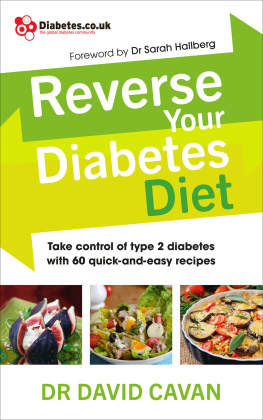
Mention of specific companies, organizations, or authorities in this book does not imply endorsement by the author or publisher, nor does mention of specific companies, organizations, or authorities imply that they endorse this book, its author, or the publisher.
Internet addresses and phone numbers given in this book were accurate at the time it went to press.
2018 by Neal D. Barnard, MD
All rights reserved. No part of this publication may be reproduced or transmitted in any form or by any means, electronic or mechanical, including photocopying, recording, or any other information storage and retrieval system, without the written permission of the publisher.
Book design by Yeon Kim
Library of Congress Cataloging-in-Publication Data is on file with the publisher.
ISBN 9781623369293 hardcover
ISBN 9781623369309 e-book

We inspire health, healing, happiness, and love in the world.
Starting with you.
RodaleBooks.com
RodaleWellness.com
This book is dedicated to our research participants,to the team at the Physicians Committee for Responsible Medicine,and to our many friends and colleagues who have brought forward new power to tackle diabetes.

CONTENTS
A NOTE TO THE READER
The program you are about to begin takes a powerful approach to diabetes. Our focus is not on pills or shots, but on foods, and it is the most delicious prescription you could imagine. A dietary change can dramatically improve your health and can sometimes even make diabetes go away, for all intents and purposes.
Before we begin, let me share some important tips.
SEE YOUR DOCTOR Let your doctor know that you are improving your eating habits. Its not that dietary changes are dangerous. Quite the oppositethey are extraordinarily healthful. But the combination of a powerful change in your diet, along with medications you may already be taking, can mean that your blood sugar could actually fall too low. And exercise can drop your blood sugar even further. So be sure to speak with your doctor before you start, so that your medications can be adjusted or stopped when the time is right.
USE A BLOOD GLUCOSE METER Your meter will help you track your progress and help you to know if your blood sugar is dipping low enough that your doctor should reduce or stop your medications.
GET COMPLETE NUTRITION Although the foods youll learn about in this book are very nutritiousmore so than those recommended in other diabetes regimensthere are two supplements that I highly recommend.
Vitamin B12 is essential for healthy nerves and healthy blood cells, but it is not made by plants or animals. So as you begin a plant-based diet, it .
Vitamin D helps your body absorb calcium from the foods you eat and also helps prevent cancer. In sunny locales, sunlight on your skin can produce all the vitamin D you need. However, if you live in a not-so-sunny spot, stay indoors for much of the time, or use sunscreen, you are likely to be low in vitamin D. A supplement of 2,000 IU Per day is safe and helpful.
SHARE THIS INFORMATION You may know other people who are dealing with diabetes, excess weight, or other health issues. Many have not heard of the approach that is in your hands now, and they will benefit enormously if you will share what you have learned with them.
Now, lets jump in!
INTRODUCTION
At Yale University, researchers turned our understanding of type 2 diabetes on its head. At the time, a common belief was that diabetes was caused by eating too much sugar or too many carbohydrate-rich foods, such as bread or potatoes. That was an understandable notion, because people with diabetes have too much sugar in their bloodstreams. It made sense to think that maybe the whole problem was that they had too much candy, soda, bread, etc., in their diets. Hundreds of guides were written advising people to limit sugar, potatoes, fruit, pasta, beans, and other sweet or starchy foods. Unfortunately, these dietary changes didnt help very much.
But using a high-tech scanning technology called magnetic resonance spectroscopy, the Yale researchers looked inside the cells of people with diabetes, and what they found revolutionized our understanding of this disease.
Hidden inside muscle and liver cells, the Yale team found microscopic particles of fat. This was not belly fat or thigh fat; it was fat inside the muscle and liver cells. It had come from the foods the research participants had been eating, and it had lodged in their cells. Once inside, those fat particles kept sugar from entering the cells. More specifically, the fat particles interfered with insulinthe hormone that normally escorts sugar into cells. If insulin can no longer move sugar into cells, sugar builds up outside your cells, in your bloodstream.
In other words, diabetes isnt caused by eating too much sugar or carbohydrate. Rather, it apparently starts with fat building up inside the cells. And that causes insulin resistanceinsulin no longer works normally. And it also became clear that the answer to type 2 diabetes is not to avoid potatoes, bread, fruit, or other sweet or starchy foods, but rather to counteract the fat buildup inside the cells.
At the Physicians Committee for Responsible Medicine, our research team has been working on ways to do just that. We tested a diet that had no animal fat at all and very little vegetable oil. In theory, this ought to cause that intracellular fat buildup to start to disappear. In a head-to-head test, we compared this low-fat vegan diet with a conventional diabetes diet in people with type 2 diabetes.
The results were spectacular. After 22 weeks, the vegan diet led to a threefold greater improvement in blood sugar control, compared with the conventional diabetes diet. This was all the more remarkable because the people on the conventional diet were carefully limiting their portions and trying not to overdo it on carbs, while the vegan group participants were free to eat as much food as they wished, with no limits on calories, carbohydrates, or portion sizes, and they made no changes to their exercise patterns or medications. The dietary change alone slashed their blood sugar levels. They also improved their cholesterol levels and lost weight. It turned out to be an extraordinarily powerful dietary approach to diabetes and all the health problems that go with it.
If this wonderful news is something you have not heard beforeor if your doctor never mentioned any of thisthe reason is that our National Institutes of Health study findings were first published by the American Diabetes Association in Diabetes Care in 2006, and some doctors are still treating diabetes based on the knowledge they picked up before that date. Moreover, in medical training, pharmaceuticals have eclipsed nutritioneven for conditions like diabetes or high cholesterol levels, where food choices are the central consideration. Doctors have focused their attention on drugs, even though food changes are often safer, more powerful, and much more patient-friendly.

















